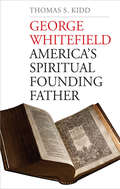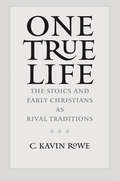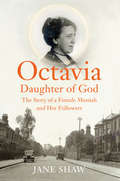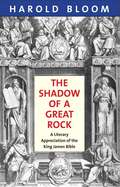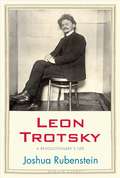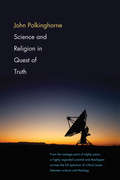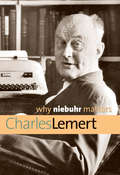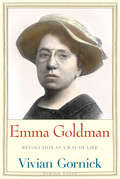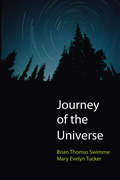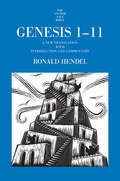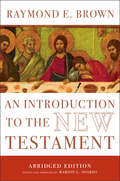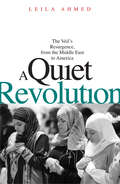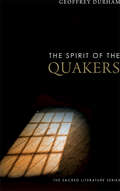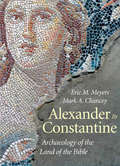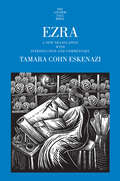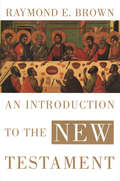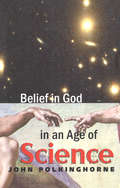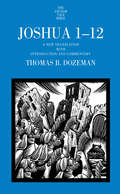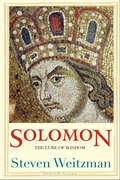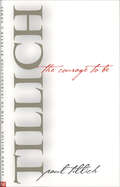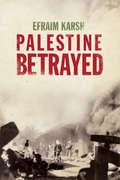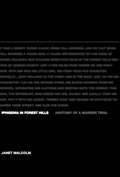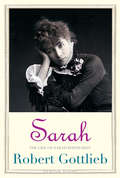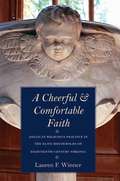- Table View
- List View
George Whitefield
by Thomas S. KiddIn the years prior to the American Revolution, George Whitefield was the most famous man in the colonies. Thomas Kidd’s fascinating new biography explores the extraordinary career of the most influential figure in the first generation of Anglo-American evangelical Christianity, examining his sometimes troubling stands on the pressing issues of the day, both secular and spiritual, and his relationships with such famous contemporaries as Benjamin Franklin, Jonathan Edwards, and John Wesley. Based on the author’s comprehensive studies of Whitefield’s original sermons, journals, and letters, this excellent history chronicles the phenomenal rise of the trailblazer of the Great Awakening. Whitefield’s leadership role among the new evangelicals of the eighteenth century and his many religious disputes are meticulously covered, as are his major legacies and the permanent marks he left on evangelical Christian faith. It is arguably the most balanced biography to date of a controversial religious leader who, though relatively unknown three hundred years after his birth, was a true giant in his day and remains an important figure in America’s history.
One True Life: The Stoics and Early Christians as Rival Traditions
by C. Kavin RoweIn this groundbreaking, cross-disciplinary work of philosophy and biblical studies, New Testament scholar C. Kavin Rowe explores the promise and problems inherent in engaging rival philosophical claims to what is true. Juxtaposing the Roman Stoics Seneca, Epictetus, and Marcus Aurelius with the Christian saints Paul, Luke, and Justin Martyr, and incorporating the contemporary views of Jeffrey Stout, Alasdair McIntyre, Charles Taylor, Martha Nussbaum, Pierre Hadot, and others, the author suggests that in a world of religious pluralism there is negligible gain in sampling from separate belief systems. This thought-provoking volume reconceives the relationship between ancient philosophy and emergent Christianity as a rivalry between strong traditions of life and offers powerful arguments for the exclusive commitment to a community of belief and a particular form of philosophical life as the path to existential truth.
Octavia, Daughter Of God
by Jane ShawIn 1919, in the wake of the upheaval of World War I, a remarkable group of English women came up with their own solution to the world's grief: a new religion. At the heart of the Panacea Society was a charismatic and autocratic leader, a vicar's widow named Mabel Barltrop. Her followers called her Octavia, and believed that she was the daughter of God, sent to build the New Jerusalem in Bedford. Proclaiming the female aspects of God, Octavia attracted former suffragettes, middle-class Christian women and passionate spiritual seekers to Bedford, where they followed her in rigorous religious practices. She appointed twelve women as her apostles, and put the rest to work to spread her Word: that human beings, through Panacea, could achieve immortal life on earth. Acclaimed historian Jane Shaw found the last living members of the Panacea Society, who revealed to her their immense, painstakingly-preserved archives. She discovered a utopian community that once had seventy residents, thousands of followers, and an international healing ministry that reached 130,000 people around the globe. Octavia, Daughter of Godis a fascinating group biography and a revelatory work of cultural and narrative history. Vividly told, by turns funny and tragic, it reveals in intimate detail the complex, out-sized personality of Octavia; the faith of her devoted followers, who believed they would never die; and the intricacies and intrigues of her close-knit community. ButOctavia, Daughter of Godis also about a moment at the advent of modernity, when a generation of newly empowered women tried to re-make Christianity in their own image. Startlingly modern in their resolve and curiously reactionary in their social views and politics, their story is a portrait of an age. It offers a window into the anxieties and hopes of the interwar years through the lives of ordinary people who believed extraordinary things about God, this world and the next.
The Shadow of A Great Rock: A Literary Appreciation of the King James Bible
by Harold BloomThe King James Bible stands at "the sublime summit of literature in English," sharing the honor only with Shakespeare, Harold Bloom contends in the opening pages of this illuminating literary tour. Distilling the insights acquired from a significant portion of his career as a brilliant critic and teacher, he offers readers at last the book he has been writing "all my long life," a magisterial and intimately perceptive reading of the King James Bible as a literary masterpiece. Bloom calls it an "inexplicable wonder" that a rather undistinguished group of writers could bring forth such a magnificent work of literature, and he credits William Tyndale as their fountainhead. Reading the King James Bible alongside Tyndale's Bible, the Geneva Bible, and the original Hebrew and Greek texts, Bloom highlights how the translators and editors improved upon--or, in some cases, diminished--the earlier versions. He invites readers to hear the baroque inventiveness in such sublime books as the Song of Songs, Ecclesiastes, and Job, and alerts us to the echoes of the King James Bible in works from the Romantic period to the present day. Throughout, Bloom makes an impassioned and convincing case for reading the King James Bible as literature, free from dogma and with an appreciation of its enduring aesthetic value.
Leon Trotsky: A Revolutionary's Life
by Joshua RubensteinBorn Lev Davidovich Bronstein in southern Ukraine, Trotsky was both a world-class intellectual and a man capable of the most narrow-minded ideological dogmatism. He was an effective military strategist and an adept diplomat, who staked the fate of the Bolshevik revolution on the meager foundation of a Europe-wide Communist upheaval. He was a master politician who played his cards badly in the momentous struggle for power against Stalin in the 1920s. And he was an assimilated, indifferent Jew who was among the first to foresee that Hitler's triumph would mean disaster for his fellow European Jews, and that Stalin would attempt to forge an alliance with Hitler if Soviet overtures to the Western democracies failed. Here, Trotsky emerges as a brilliant and brilliantly flawed man. Rubenstein offers us a Trotsky who is mentally acute and impatient with others, one of the finest students of contemporary politics who refused to engage in the nitty-gritty of party organization in the 1920s, when Stalin was maneuvering, inexorably, toward Trotsky's own political oblivion. As Joshua Rubenstein writes in his preface, "Leon Trotsky haunts our historical memory. A preeminent revolutionary figure and a masterful writer, Trotsky led an upheaval that helped to define the contours of twentieth-century politics. " In this lucid and judicious evocation of Trotsky's life, Joshua Rubenstein gives us an interpretation for the twenty-first century.
Science and Religion in Quest of Truth
by John PolkinghorneJohn Polkinghorne, an international figure known both for his contributions to the field of theoretical elementary particle physics and for his work as a theologian, has over the years filled a bookshelf with writings devoted to specific topics in science and religion. In this new book, he undertakes for the first time a survey of all the major issues at the intersection of science and religion, concentrating on what he considers the essential insights for each. Clearly and without assuming prior knowledge, he addresses causality, cosmology, evolution, consciousness, natural theology, divine providence, revelation, and scripture. Each chapter also provides references to his other books in which more detailed treatments of specific issues can be found. For those who are new to what Polkinghorne calls "one of the most significant interdisciplinary interactions of our time," this volume serves as an excellent introduction. For readers already familiar with John Polkinghorne's books, this latest is a welcome reminder of the breadth of his thought and the subtlety of his approach in the quest for truthful understanding.
why niebuhr matters
by Charles LemertReinhold Niebuhr (1892-1971) was a Protestant preacher, an influential religious thinker, and an important moral guide in mid-twentieth-century America. But what does he have to say to us now? In what way does he inform the thinking of political leaders and commentators from Barack Obama and Madeleine Albright to David Brooks and Walter Russell Mead, all of whom acknowledge his influence? In this lively overview of Niebuhr's career, Charles Lemert analyzes why interest in Niebuhr is rising and how Niebuhr provides the answers we ache for in the face of seismic shifts in the global order. In the middle of the twentieth century, having outgrown a theological liberalism, Niebuhr challenged and rethought the nonsocialist Left in American politics. He developed a political realism that refused to sacrifice ideals to mere pragmatism, or politics to bitterness and greed. He examined the problem of morality in an immoral society and reimagined the balance between rights and freedom for the individual and social justice for the many. With brevity and deep insight, Lemert shows how Niebuhr's ideas illuminate our most difficult questions today.
Emma Goldman: Revolution as a Way of Life
by Vivian GornickEmma Goldman is the story of a modern radical who took seriously the idea that inner liberation is the first business of social revolution. Her politics, from beginning to end, was based on resistance to that which thwarted the free development of the inner self. The right to stay alive in one's senses, to enjoy freedom of thought and speech, to reject the arbitrary use of power--these were key demands in the many public protest movements she helped mount. Anarchist par excellence, Goldman is one of the memorable political figures of our time, not because of her gift for theory or analysis or even strategy, but because some extraordinary force of life in her burned, without rest or respite, on behalf of human integrity--and she was able to make the thousands of people who, for decades on end, flocked to her lectures, feel intimately connected to the pain inherent in the abuse of that integrity. To hear Emma describe, in language as magnetic as it was illuminating, what the boot felt like on the neck, was to experience the mythic quality of organized oppression. As the women and men in her audience listened to her, the homeliness of their own small lives became invested with a sense of drama that acted as a catalyst for the wild, vagrant hope that things need not always be as they were. All you had to do, she promised, was resist. In time, she herself would become a world-famous symbol for the spirit of resistance to the power of institutional authority over the lone individual. In Emma Goldman, Vivian Gornick draws a surpassingly intimate and insightful portrait of a woman of heroic proportions whose performance on the stage of history did what Tolstoy said a work of art should do: it made people love life more.
Journey of the Universe: Christian Responses To Journey Of The Universe (Ecology And Justice Ser.)
by Brian Thomas Swimme Mary Evelyn TuckerThe basis for the Emmy-winning film. &“A wonderful, highly readable account of the history of the universe from the Big Bang through the present moment.&”—Thomas Lovejoy, University Professor in Environmental Science and Policy, George Mason University Through the astonishing combined achievements of natural scientists worldwide, we now have a detailed account of how galaxies and stars, planets and living organisms, human beings and human consciousness came to be. And yet . . . we thirst for answers to questions that have haunted humanity from the very beginning. What is our place in the 14-billion-year history of the universe? What roles do we play in Earth&’s history? How do we connect with the intricate web of life on Earth? In Journey of the Universe, Brian Thomas Swimme and Mary Evelyn Tucker tell the epic story of the universe from an inspired new perspective, weaving the findings of modern science together with enduring wisdom found in the humanistic traditions of the West, China, India, and indigenous peoples. The authors explore cosmic evolution as a profoundly wondrous process based on creativity, connection, and interdependence, and they envision an unprecedented opportunity for the world&’s people to address the daunting ecological and social challenges of our times. Journey of the Universe transforms how we understand our origins and envision our future. Though a little book, it tells a big story one that inspires hope for a way in which Earth and its human civilizations could flourish together. &“What&’s most striking about Swimme and Tucker&’s work is a simple but beautiful assumption: a cosmological orientation opens the human mind to wonder, gratitude, humility, and creativity.&”—Orion
Genesis 1-11: A New Translation with Introduction and Commentary (The Anchor Yale Bible Commentaries)
by Ronald HendelThe first volume of a groundbreaking two-part commentary on the book of Genesis by leading biblical scholar Ronald Hendel The first eleven chapters of Genesis narrate the origin of the universe; the creation of the first human beings; the beginnings of moral reasoning, society, and culture; and the cataclysmic global flood. By showing how life and civilization came into being, Genesis 1–11 offers a richly drawn map for understanding the world as a meaningful cosmos and an ethical guide for human purpose and responsibility within it. The culmination of over thirty years of research, this long-awaited study by leading Genesis scholar Ronald Hendel is the first comprehensive scholarly commentary on Genesis 1–11 in a generation. Drawing on archaeological discoveries from Israel and the ancient Near East as well as contemporary methods of scholarship, it presents a multilayered view of the classic text. The extensive introduction, notes, and comments explore ancient textual versions and editions, historical contexts, literary style and design, compositional history, cosmology, ethics, and the book&’s interpretive life in Judaism and Christianity. Featuring numerous illustrations, this engagingly written commentary is an indispensable, field-defining guide to the first eleven chapters of the Bible.
An Introduction to the New Testament: The Abridged Edition
by Raymond E. Brown Marion SoardsSince its publication in 1997, Raymond Brown's Introduction to the New Testament has been widely embraced by modern readers seeking to understand the Christian Bible. Acknowledged as a paragon of New Testament studies in his lifetime, Brown was a gifted communicator who wrote with ease and clarity.  Abridged by Marion Soards, who worked with Brown on the original text, this new, concise version maintains the essence and centrist interpretation of the original without tampering with Brown's perspective, insights, or conclusions. The biblical writings themselves remain the focus, but there are also chapters dealing with the nature, origin, and interpretation of the New Testament texts, as well as chapters concerning the political, social, religious, and philosophical world of antiquity. Furthermore, augmenting Brown's commentary on the New Testament itself are topics such as the Gospels' relationship to one another; the form and function of ancient letters; Paul's thought and life, along with his motivation, legacy, and theology; a reflection on the historical Jesus; and a survey of relevant Jewish and Christian writings.  This comprehensive, reliable, and authoritative guidebook is now more accessible for novices, general readers, Bible study groups, ministers, scholars, and students alike.
Before the Door of God: An Anthology of Devotional Poetry
by Kimberly Johnson Jay HoplerBefore the Door of God traces the development of devotional English-language poetry from its origins in ancient hymnody to its current twenty-first-century incarnations. The poems in this volume demonstrate not only that devotional poetry—poetry that speaks to the divine—remains in vigorous practice, but also that the tradition reaches back to the very origins of poetry in English. There is a sense in these pages that the tradition of lyric poetry that developed was nearly inevitable, given the inherent concerns of the genre. <p><p>Featuring the work of poets over a three-thousand-year period, Before the Door of God places the devotional lyric in its cultural, historical, and aesthetic contexts. The volume traces the various influences on this tradition and identifies features that persist in devotional lyric poetry across centuries, cultures, and stylistic differences. To scholars, literary professionals, and general readers who find delight in fine poetry, this anthology offers much to contemplate and discuss.
A Quiet Revolution: The Veil's Resurgence, from the Middle East to America
by Leila AhmedIn Cairo in the 1940s, Leila Ahmed was raised by a generation of women who never dressed in the veils and headscarves their mothers and grandmothers had worn. To them, these coverings seemed irrelevant to both modern life and Islamic piety. Today, however, the majority of Muslim women throughout the Islamic world again wear the veil. Why, Ahmed asks, did this change take root so swiftly, and what does this shift mean for women, Islam, and the West? When she began her study, Ahmed assumed that the veil's return indicated a backward step for Muslim women worldwide. What she discovered, however, in the stories of British colonial officials, young Muslim feminists, Arab nationalists, pious Islamic daughters, American Muslim immigrants, violent jihadists, and peaceful Islamic activists, confounded her expectations. Ahmed observed that Islamism, with its commitments to activism in the service of the poor and in pursuit of social justice, is the strain of Islam most easily and naturally merging with western democracies' own tradition of activism in the cause of justice and social change. It is often Islamists, even more than secular Muslims, who are at the forefront of such contemporary activist struggles as civil rights and women's rights. Ahmed's surprising conclusions represent a near reversal of her thinking on this topic. Richly insightful, intricately drawn, and passionately argued, this absorbing story of the veil's resurgence, from Egypt through Saudi Arabia and into the West, suggests a dramatically new portrait of contemporary Islam.
The Spirit of the Quakers
by Geoffrey DurhamWho are the Quakers, what do they believe, and what do they practice? The Religious Society of Friends--also known as Quakers---believes that everyone can have a direct experience of God. Quakers express this in a unique form of worship that inspires them to work for change in themselves and in the world. InThe Spirit of the Quakers, Geoffrey Durham, himself a Friend, explains Quakerism through quotations from writings that cover 350 years, from the beginnings of the movement to the present day. Peace and equality are major themes in the book, but readers will also find thought-provoking passages on the importance of action for social change, the primacy of truth, the value of simplicity, the need for a sense of community, and much more. The quoted texts convey a powerful religious impulse, courage in the face of persecution, the warmth of human relationships, and dedicated perseverance in promoting just causes. The extended quotations have been carefully selected from well-known Quakers such as George Fox, William Penn, John Greenleaf Whittier, Elizabeth Fry and John Woolman, as well as many contemporary Friends. Together with Geoffrey Durham's enlightening and sympathetic introductions to the texts, the extracts from these writers form an engaging, often moving guide to this accessible and open-hearted religious faith.
Alexander to Constantine
by Eric M. Meyers Mark A. ChanceyDrawing on the most recent, groundbreaking archaeological research, Eric M. Meyers and Mark A. Chancey re-narrate the history of ancient Palestine in this richly illustrated and expertly integrated book. Spanning from the conquest of Alexander the Great in the fourth century BCE until the reign of the Roman emperor Constantine in the fourth century CE, they synthesize archaeological evidence with ancient literary sources (including the Bible) to offer a sustained overview of the tumultuous intellectual and religious changes that impacted world history during the Greco-Roman period. The authors demonstrate how the transformation of the ancient Near East under the influence of the Greeks and then the Romans led to foundational changes in both the material and intellectual worlds of the Levant. Palestine's subjection to Hellenistic kingdoms, its rule by the Hasmonean and Herodian dynasties, the two disastrous Jewish revolts against Rome, and its full incorporation into the Roman Empire provide a background for the emergence of Christianity. The authors observe in the archaeological record how Judaism and Christianity were virtually undistinguishable for centuries, until the rise of imperial Christianity with Emperor Constantine. The only book-length overview available that focuses on the archaeology of Palestine in this period, this comprehensive and powerfully illuminating work sheds new light on the lands of the Bible.
Ezra: A New Translation with Introduction and Commentary (The Anchor Yale Bible Commentaries)
by Tamara Cohn EskenaziA new translation and commentary on the biblical book of Ezra by the renowned author of two award-winning biblical commentaries The book of Ezra is a remarkable testament to a nation’s ability to survive and develop a distinctive identity under imperial rule. But Ezra is far more than a simple chronicle; it constitutes a new biblical model for political, religious, and social order in the Persian Empire. In this new volume, Tamara Cohn Eskenazi illustrates how the book of Ezra envisions the radical transformation that followed reconstruction after the fall of Jerusalem and Judah. The extensive introduction highlights the book’s innovations, including its textualization of the tradition, as well as the unprecedented role of the people as chief protagonists. The translation and commentary incorporate evidence from ancient and contemporaneous primary sources from Egypt, Babylonia, Greece, and Persia, along with new archaeological studies of Judah. With great care and detail, Eskenazi demonstrates how the book of Ezra creates a blueprint for survival after destruction, shaping a new kind of society and forging a new communal identity.
An Introduction to the New Testament
by Raymond E. BrownFrom the experience of a lifetime of scholarship, preaching, teaching, and writing, Raymond E. Brown covers the entire scope of the New Testament with ease and clarity. He walks readers book by book through the basic content and issues of the New Testament. While a wealth of information is contained in these pages, the work's most impressive features are the basic summaries of each book, a historical overview of the ancient Greco-Roman world, discussions of key theological issues, and the rich supplementary materials, such as illustrative tables, maps, bibliographies, and appendixes. Using this basic data, Brown answers questions raised by today's readers, relates the New Testament to our modern world, and responds to controversial issues, such as those raised by the Jesus Seminar. Every generation needs a comprehensive, reliable Introduction to the New Testament that opens the biblical text to the novice. Raymond E. Brown's An Introduction to the New Testament is the most trustworthy and authoritative guidebook for a generation seeking to understand the Christian Bible. Universally acknowledged as the dean of New Testament scholarship, Father Brown is a master of his discipline at the pinnacle of his career. Who else could cover the entire scope of the New Testament with such ease and clarity? This gifted communicator conveys the heartfelt concern of a beloved teacher for his students, as he walks the reader through the basic content and issues of the New Testament. Those opening to the New Testament for the first time and those seeking deeper insights could not ask for more in a primer to the Christian Bible.
Belief in God in an Age of Science
by John PolkinghorneJohn Polkinghorne is a major figure in today's debates over the compatibility of science and religion. Internationally known as both a theoretical physicist and a theologian-the only ordained member of the Royal Society-Polkinghorne brings unique qualifications to his inquiry into the possibilities of believing in God in an age of science. In this thought-provoking book, the author focuses on the collegiality between science and theology, contending that these "intellectual cousins" are both concerned with interpreted experience and with the quest for truth about reality. He argues eloquently that scientific and theological inquiries are parallel.The book begins with a discussion of what belief in God can mean in our times. Polkinghorne explores a new natural theology and emphasizes the importance of moral and aesthetic experience and the human intuition of value and hope. In other chapters, he compares science's struggle to understand the nature of light with Christian theology's struggle to understand the nature of Christ. He addresses the question, Does God act in the physical world? And he extends his ideas about the role of chaos theory, surveys the prospects for future dialogue between scientific and theological thinkers, and defends a critical realist understanding of the activities of both disciplines. Polkinghorne concludes with a consideration of the nature of mathematical truths and the links between the complementary realities of physical and mental experience.
Joshua 1-12
by Thomas B. DozemanAn acknowledged expert on the Hebrew Bible, Thomas Dozeman offers a fresh translation of the Hebrew and Greek texts of the book of Joshua and explores the nature, function, and causes of the religious violence depicted therein. By blending the distinct teachings of Deuteronomy and the Priestly literature, Dozeman provides a unique interpretation of holy war as a form of sacred genocide, arguing that, since peace in the promised land required the elimination of the populations of all existent royal cities, a general purging of the land accompanied the progress of the ark of the covenant. This essential work of religious scholarship demonstrates how the theme of total genocide is reinterpreted as partial conquest when redactors place Joshua, an independent book, between Deuteronomy and Judges. The author traces the evolution of this reinterpretation of the central themes of religious violence while providing a comparison of the two textual versions of Joshua and an insightful analysis of the book's reception history.
Solomon: The Lure of Wisdom
by Steven WeitzmanTradition has it that King Solomon knew everything there was to know--the mysteries of nature, of love, of God himself--but what do we know of him? Esteemed biblical scholar Steven Weitzman reintroduces readers to Solomon's story and its surprising influence in shaping Western culture, and he also examines what Solomon's life, wisdom, and writings have come to mean for Jews, Christians, and Muslims over the past two thousand years. Weitzman's Solomon is populated by a colorful cast of ambitious characters--Byzantine emperors, explorers, rabbis, saints, scientists, poets, archaeologists, trial judges, reggae singers, and moviemakers among them--whose common goal is to unearth the truth about Solomon's life and wisdom. Filled with the Solomonic texts of the Bible, along with lesser-known magical texts and other writings, this book challenges both religious and secular assumptions. Even as it seeks to tell the story of ancient Israel's greatest ruler, this insightful book is also a meditation on the Solomonic desire to know all of life's secrets, and on the role of this desire in world history.
The Courage to Be: Second Edition (The Terry Lectures Series)
by Paul TillichThe imminent philosopher and theologian examines religion in light of science and philosophy in modern society. Originally published more than fifty years ago, The Courage to Be has become a classic of twentieth-century religious and philosophical thought. The great Christian existentialist thinker Paul Tillich describes the dilemma of modern man and points a way to the conquest of the prob-lem of anxiety. This edition includes a new introduction by Harvey Cox that situates the book within the theological conversation into which it first appeared and conveys its continued rele-vance in the current century.&“The brilliance, the wealth of illustration, and the aptness of personal application…make the reading of these chapters an exciting experience.&”—W. Norman Pittenger, New York Times Book Review &“The essential character of courage, for Tillich, is &“in spite of.&” We must go on striving for freedom, justice, and our faith in spite of oppositions. In this age of late capitalism, globalization, and terrorism, we all need the virtue of courage as Harvey Cox admirably argues in the foreword.&”—Nimi Wariboko, Andover Newton Theological School, Newton Centre, MA "Tillich struggled with the existential question how we may overcome the demoralizing effects, on the individual and society, of our Age of Anxiety. In this, his most popular book, Tillich gives us his deeply thought answers, and Harvey Cox provides a helpful new introduction."—Gerald Holton, Harvard University
Palestine Betrayed
by Efraim KarshThe 1947 UN resolution to partition Palestine irrevocably changed the political landscape of the Middle East, giving rise to six full-fledged wars between Arabs and Jews, countless armed clashes, blockades, and terrorism, as well as a profound shattering of Palestinian Arab society. Its origins, and that of the wider Arab-Israeli conflict, are deeply rooted in Jewish-Arab confrontation and appropriation in Palestine. But the isolated occasions of violence during the British Mandate era (1920-48) suggest that the majority of Palestinian Arabs yearned to live and thrive under peaceful coexistence with the evolving Jewish national enterprise. So what was the real cause of the breakdown in relations between the two communities? In this brave and groundbreaking book, Efraim Karsh tells the story from both the Arab and Jewish perspectives. He argues that from the early 1920s onward, a corrupt and extremist leadership worked toward eliminating the Jewish national revival and protecting its own interests. Karsh has mined many of the Western, Soviet, UN, and Israeli documents declassified over the past decade, as well as unfamiliar Arab sources, to reveal what happened behind the scenes on both Palestinian and Jewish sides. It is an arresting story of delicate political and diplomatic maneuvering by leading figures--Ben Gurion, Hajj Amin Husseini, Abdel Rahman Azzam, King Abdullah, Bevin, and Truman --over the years leading up to partition, through the slide to war and its enduring consequences. Palestine Betrayedis vital reading for understanding the origin of disputes that remain crucial today.
Iphigenia in Forest Hills
by Janet Malcolm"Astringent and absorbing. . . Iphigenia in Forest Hillscasts, from its first pages, a genuine spell -- the kind of spell to which Ms. Malcolm's admirers (and I am one) have become addicted. " --Dwight Garner,New York Times "She couldn't have done it and she must have done it. " This is the enigma at the heart of Janet Malcolm's riveting new book about a murder trial in the insular Bukharan-Jewish community of Forest Hills, Queens, that captured national attention. The defendant, Mazoltuv Borukhova, a beautiful young physician, is accused of hiring an assassin to kill her estranged husband, Daniel Malakov, a respected orthodontist, in the presence of their four-year old child. The prosecutor calls it an act of vengeance: just weeks before Malakov was killed in cold blood, he was given custody of Michelle for inexplicable reasons. It is the "Dickensian ordeal" of Borukhova's innocent child that drives Malcolm's inquiry. With the intellectual and emotional precision for which she is known, Malcolm looks at the trial--"a contest between competing narratives"--from every conceivable angle. It is the chasm between our ideals of justice and the human factors that influence every trial--from divergent lawyering abilities to the nature of jury selection, the malleability of evidence, and the disposition of the judge--that is perhaps most striking. Surely one of the most keenly observed trial books ever written,Iphigenia in Forest Hillsis ultimately about character and "reasonable doubt. " As Jeffrey Rosen writes, it is "as suspenseful and exciting as a detective story, with all the moral and intellectual interest of a great novel. " "Iphigenia in Forest Hillsis another dazzling triumph from Janet Malcolm. Here, as always, Malcolm's work inspires the best kind of disquiet in a reader--the obligation to think. " --Jeffrey Toobin, author ofThe Nine: Inside the Secret World of the Supreme Court "A remarkable achievement that ranks with Malcolm's greatest books. Her scrupulous reporting and interviews with protagonists on both sides of the trial make her own narrative as suspenseful and exciting as a detective story, with all the moral and intellectual interest of a great novel. " --Jeffrey Rosen, author ofThe Supreme Court: The Personalities and Rivalries that Defined America
Sarah: The Life of Sarah Bernhardt
by Robert GottliebEverything about Sarah Bernhardt is fascinating, from her obscure birth to her glorious career--redefining the very nature of her art--to her amazing (and highly public) romantic life to her indomitable spirit. Well into her seventies, after the amputation of her leg, she was performing under bombardment for soldiers during World War I, as well as crisscrossing America on her ninth American tour. Her family was also a source of curiosity: the mother she adored and who scorned her; her two half-sisters, who died young after lives of dissipation; and most of all, her son, Maurice, whom she worshiped and raised as an aristocrat, in the style appropriate to his presumed father, the Belgian Prince de Ligne. Only once did they quarrel--over the Dreyfus Affair. Maurice was a right-wing snob; Sarah, always proud of her Jewish heritage, was a passionate Dreyfusard and Zolaist. Though the Bernhardt literature is vast, Gottlieb'sSarah is the first English-language biography to appear in decades. Brilliantly, it tracks the trajectory through which an illegitimate--and scandalous--daughter of a courtesan transformed herself into the most famous actress who ever lived, and into a national icon, a symbol of France.
A Cheerful and Comfortable Faith: Anglican Religious Practice in the Elite Households of Eighteenth-Century Virginia
by Lauren F. WinnerThis enlightening book examines the physical objects found in elite Virginia households of the eighteenth century to discover what they can tell us about their owners' lives and religious practices. Lauren F. Winner looks closely at punch bowls, needlework, mourning jewelry, baptismal gowns, biscuit molds, cookbooks, and many other items, illuminating the ways Anglicanism influenced daily activities and attitudes in colonial Virginia, particularly in the households of the gentry.
